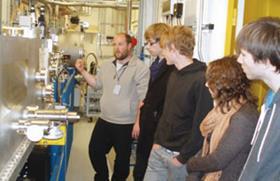In November, 32 RSC ChemNet members visited Diamond Light Source in Didcot. Education in Chemistry went along to find out more
Opened in 2007, this particle accelerator accelerates electrons to give a source of extremely intense light-rather than smashing high energy particles together like the Large Hadron Collider. It can be thought of as a gigantic x-ray machine.

The group that Education in Chemistry accompanied was allowed up close to this gigantic device. Over 2000 research groups use this world class facility each year and during our visit we learnt how different chemists use the synchrotron. Previous work at Diamond has included: Understanding corrosion processes to allow better design of construction materials; analysis of the distribution of the minerals in grains to produce more nutritious foods; and investigations into the design of novel hydrogen fuel storage materials.
Diamond's electron beam is sped up and then sent around a circular storage ring by magnets. Our guide took the pupils up close and into the storage ring section, which is kept behind 1.5m of concrete shielding. Inside, the ring is kept at a vacuum pressure equivalent to 10 miles high in space, so that the electron beam does not lose electrons due to collisions. More magnets turn the electron beam into x-rays before the x-rays are filtered and focused before they reach whatever is being studied.
When operational, the machine runs 24/7, so scientists work in shifts to make the most of their allocated slot. Our tour guide observed that it's not unusual to see PhD students arrive with a box of samples and a packet of biscuits to sustain them through the night.
Diamond Light Source was directly mentioned in the Comprehensive Spending Review, when the funding for its Phase III expansion was confirmed. Mark Basham, a scientist working at the Diamond Light Source, said that "The Phase III expansion will make more adventurous and cutting-edge experiments possible."
Diamond Light Source has an excellent educational website, with overviews and case-studies of the machine, how it works and what it's used for.
Diamond holds open days throughout the year for the general public and families as well as hosting visits from schools. In addition there are work placements and internships available for interested pupils and university students. Further information is available on the website.






No comments yet